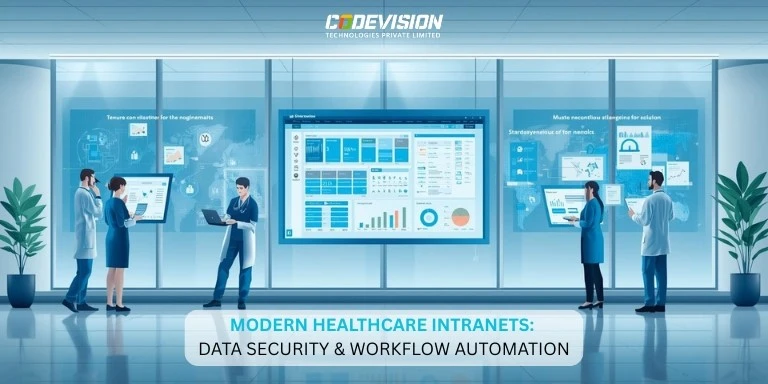Power Automate vs Zapier: Which Automation Tool Gives Your Business the Edge?

- Why Automation Is the Smartest Move You’ll Make This Year
- The Hidden Cost of Repetitive Work: 30% Productivity Lost
- Why choosing the right automation tool really matters
- What Is Power Automate
- Why Power Automate Stands Out
- What Is Zapier?
- Why Zapier Is a Favourite Among Startups
- Power Automate vs Zapier — Detailed Comparison
- Security Matters: What CIOs and IT Leaders Should Know
- Real-World Use Cases: Where Each Tool Shines
- Final Verdict: Which Tool Is Right for You?
- Codevision Take: Why Automation Is Non-Negotiable
Why Automation Is the Smartest Move You’ll Make This Year
The reality is that many teams lose a significant portion of their workday to repetitive tasks. Activities like data entry and follow-ups on approvals can consume up to 30% of daily productivity.
Two platforms stand out: Microsoft Power Automate and Zapier. Both help you build workflows and connect your favourite apps, but they are built for different kinds of users. Power Automate is built with big companies in mind that need compliance, scalability, and deep Microsoft 365 integration. Zapier, meanwhile, is a hit with startups and small businesses thanks to its simplicity and huge range of apps you can connect
This guide breaks down everything you need to know — from pricing and integrations to security and real-world use cases — so you can choose the automation tool that fits your business like a glove.
The Hidden Cost of Repetitive Work: 30% Productivity Lost
Tasks like reporting, approvals, and notifications quietly eat away at your team’s time. Experts have found automation often frees up 2–3 hours for each person daily. That is time you could be spending on big picture work, fresh ideas, or serving customers better.
Without automation, scaling becomes harder, and burnout becomes real.
Why choosing the right automation tool really matters

Not all automation platforms are created equal. Enterprises need robust governance, compliance, and scalability. SMBs often prioritize speed, ease of use, and flexibility.
Choose the wrong tool, and you could face poor adoption, security risks, or clunky workflows. So what should you look for? Four key factors: integration, scalability, security, and usability.
What Is Power Automate
Power Automate is Microsoft’s cloud-based automation platform. It helps organizations eliminate manual tasks and build workflows across Microsoft 365 and other services. It supports cloud flows, desktop flows (RPA), and AI Builder — making it a top pick for businesses already using Microsoft tools.
Why Power Automate Stands Out

- Strong Microsoft 365 Integration: Works seamlessly with SharePoint, Teams, Outlook, and Dynamics.
- Advanced Workflow options: Includes conditions, loops, approvals, and AI Builder.
- Robotic Process Automation (RPA): Automates legacy desktop apps.
- Security built for large organizations: Compliant with GDPR, HIPAA, ISO, and integrates with Azure AD.
- Multiple licensing options: Available as part of Microsoft 365 or standalone.
Also Read,
What Is Zapier?
Zapier is a no-code automation platform that connects over 8,000+ apps. It is designed for quick and straightforward, making it great for small teams and new businesses, and anyone who wants to automate without needing IT support.
Why Zapier Is a Favourite Among Startups

- Easy to Use: Drag-and-drop interface perfect for non-technical users.
- Massive App Library: Integrates with Google Workspace, Slack, Trello, HubSpot, Shopify, and more.
- Cloud-Only Simplicity: No desktop flows — everything runs online.
- Flexible Pricing: Free tier available, plus paid plans.
- Fast Setup: Build automations in minutes.
Power Automate vs Zapier — Detailed Comparison
| Feature | Power Automate | Zapier |
|---|---|---|
| Cost | Per-user/per-flow licensing, often bundled with Microsoft 365 | Tiered pricing, free plan available |
| Ease of Use | Complex but powerful workflows, RPA | Extremely simple, minimal learning curve |
| Integrations | Microsoft-centric (SharePoint, Teams, Dynamics) | 8,000+ third-party apps |
| Security & Compliance | Enterprise-grade, GDPR/HIPAA, Azure AD | Secure, but fewer enterprise certifications |
| Customization & Logic | Advanced branching, approvals, AI Builder | Simpler workflows, limited complex logic |
| Scalability | Designed for enterprise automation | Best for SMBs/startups |
| Deployment Models | Cloud, desktop (RPA), hybrid | 100% cloud-only |
Security Matters: What CIOs and IT Leaders Should Know
- Power Automate: Built for enterprise use — includes audit trails, Azure AD integration, and top-tier compliance.
- Zapier: Secure for most use cases but lacks the certifications and governance features needed in regulated industries.
Real-World Use Cases: Where Each Tool Shines
1. Power Automate in Enterprises
- Automating SharePoint document approvals
- Sending Teams notifications for collaboration
- Streamlining Dynamics CRM workflows
- Building compliance and reporting flows
- Using RPA to automate legacy desktop systems
2. Zapier in SMBs and Startups
- Running marketing campaigns and social media posts
- Syncing CRM data across platforms
- Managing e-commerce orders
- Creating quick reports and alerts
- Automating customer support with Zendesk, Gmail, etc.
Final Verdict: Which Tool Is Right for You?
- Power Automate: Best for enterprises, compliance-heavy workflows, and Microsoft-centric teams.
- Zapier: Ideal for startups and SMBs that need fast, flexible integrations.
- Decision Point: CIOs and IT managers → Power Automate. Startup founders → Zapier.
Codevision Take: Why Automation Is Non-Negotiable
Automation isn’t just a trend — it is the backbone of modern business. While both Power Automate and Zapier bring value, Power Automate is the clear winner for enterprise-grade automation, security, and scalability.
At Codevision, we specialize in building custom Power Automate solutions that streamline your operations, integrate seamlessly with Microsoft 365, and deliver measurable results.
Frequently Asked Questions
Automation is the use of software to perform repetitive tasks without human intervention. It saves time, reduces errors, and allows teams to focus on high-value work. Businesses using automation can boost productivity, improve customer experience, and scale operations more efficiently.
Experts estimate that automation can free up 2–3 hours per employee every day by eliminating manual data entry, approvals, notifications, and reporting tasks.
Power Automate is Microsoft’s cloud-based automation platform that helps organizations automate workflows across Microsoft 365 and other apps. It supports cloud flows, desktop flows (RPA), and AI-driven automation for enterprise-grade solutions.
Power Automate is ideal for large organizations, enterprises, or teams heavily invested in Microsoft 365. It is perfect for workflows that require compliance, scalability, and complex logic.
Zapier is a no-code automation tool that connects 8,000+ apps. It is designed for startups, small businesses, and teams that need quick, easy-to-build automations without technical expertise.
Zapier is best for startups and small-to-medium businesses that need fast, flexible, and simple automation for marketing, CRM, e-commerce, or routine notifications.
Yes, but it depends on the platform. Power Automate offers enterprise-grade security, audit trails, Azure AD integration, and compliance with GDPR, HIPAA, and ISO standards. Zapier is secure for most SMB use cases but lacks extensive enterprise certifications.
Yes. Power Automate is particularly strong in compliance-heavy workflows, enabling organizations to automate document approvals, reporting, and regulatory processes without manual intervention.
Power Automate is the preferred choice for enterprises that need robust compliance, advanced workflows, and deep Microsoft 365 integration.
Zapier is ideal for startups and SMBs that need fast, flexible integrations with minimal setup and no coding knowledge.
Codevision specializes in building custom Power Automate solutions that streamline operations, integrate with Microsoft 365, and deliver measurable results. You can book a demo to explore tailored automation strategies for your business.

Modern Regulatory Reporting in Financial Services with Microsoft Power BI




